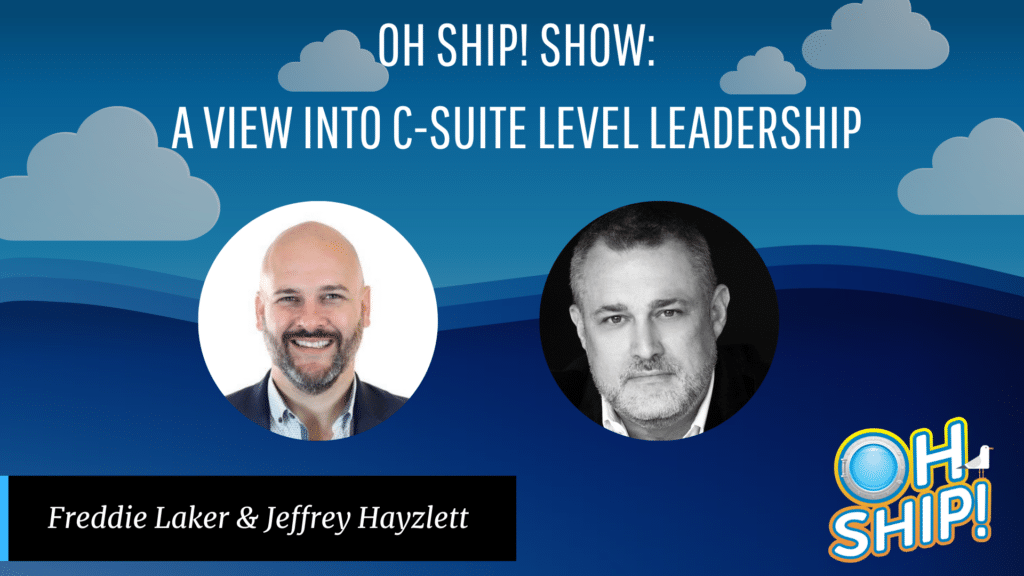Jeffrey speaks on value-based leadership and his greatest career blunders.
Jeffrey is the CEO and chairman of the C-Suite Network, which brings together people in high-level leadership positions to provide one another with support and guidance. He has also served as CMO of Kodak and a board leader at many companies. He’s bought and sold over 250 companies in his career, with about $25 billion in transactions. He’s had his own show with Bloomberg Television, and he’s worked hard to transform the way people think about social media. He’s even been on Celebrity Apprentice for three seasons as a guest judge!
The C-Suite Network has grown into a thriving community of 350,000 execs, 75 TV shows garnering 90 million views, and 250 podcast shows. They’ve experienced hockey-stick growth since their formation. Jeffrey also serves on boards of three public companies and 11 private companies, most of which he’s invested in. He loves leading teams in all of these capacities. “I’m having the time of my life. I’ve never had this much fun,” he says.
What are his biggest Oh Ship! moments?
“I’ve had lots and lots of Oh Ship! moments. Trust me, my entire career has been filled with Oh Ship! moments,” Jeffrey says. “That’s just the nature of business.”
Some mistakes have related to the type of company he tried to start. “Once, I invested in a pheasant farm, and I tried to corner the market on pheasants until I realized there wasn’t one,” he says. “It’s a foul business.”
The problem wasn’t so much selling them as raising them. Since they’re wild birds, they had pens the size of football fields in South Dakota, where Jeffrey is based. Then, a big storm came rolling through, and the pheasants lifted their beaks and drowned.
But usually, when asked about his biggest mistake, Jeffrey will say, “I don’t know; I haven’t made it yet.” If you’re always striving for bigger goals, you’ll be making bigger mistakes, he explains.
Why do leaders need a support network?
We’re now dealing with COVID, the worst economic conditions we’ve ever seen, and a wave of the most egregious racism many people have ever witnessed, layered with personal issues like serious depression, Jeffrey asserts. In light of these pervasive issues, a support network for leaders is more crucial today than ever, he says.
In South Dakota, they’re already pros at physical distancing, Jeffrey jokes—but social connection is essential, and the C-Suite Network has given people a way to connect during COVID.
Leaders today are tasked with navigating pressing challenges like what to do with office space or how to know their employees are doing the work at home. Years’ worth of change have been happening in mere months, and they must generate strategic solutions to respond to an ever-changing situation. “By coming together, by sharing, you learn, and then, you can start to cheer. And quite frankly, you just start to care for each other,” Jeffrey says. “We help people to step into an environment where they can take the armor off.”
In the absence of trade shows and other traditional modes of reaching people, many leaders have been struck with the realization that they need to try something new, like launching a podcast or a blog, which can feel overwhelming. The network helps them figure out how to go about doing it, offering meetings, content, and a concierge of services, in addition to a community of senior leaders.
They hold meetups where they tackle tough subjects in conversation. Heated debates can arise. “If you don’t have some conflict, if you don’t have some friction, then you’re not pushing the conversation enough,” Jeffrey says. “And good, healthy debate is a wonderful thing to have in the C-suite or anywhere.” They do a Sunday scotch night that starts at 9 p.m. Eastern and runs from an hour and a half to three hours.
Importantly, leaders have the opportunity to talk about how they uphold their values in business, which is the theme of one of their groups called the Hero Club. That’s a major focal area for Jeffrey, who wrote a book called The Hero Factor about how great leaders put people before profit. While 53% of employees aren’t engaged in their business, value-based companies increase their employee loyalty, he says. Socially and environmentally conscious businesses also gross more money and have happier customers and vendors. People look to them as examples to follow or even heroes in their community.
How do you create a truly value-based organization?
The key to creating a value-based organization and culture is having the backbone that allows you to uphold your principles, says Jeffrey. While some leaders will lay off a bunch of people and then take a huge profit, others make personal sacrifices for the team.
Right now, people are struggling. Jeffrey’s own company’s profits have been down this year. And it’s important to do the right thing even when it brings no personal benefits. “Never have I worked so hard for so little. But I didn’t lay anybody off—I kept everybody employed, grew the company, served more people than I’ve ever served in the history of our company combined, in one year,” he says.
Most leaders want to do the right thing, but they don’t always know what that is, Jeffrey says. That’s why the C-Suite Network exists. It’s about the 3 Rs: relevancy, reach, and reciprocity, he explains.
Jeffrey and other leaders once resigned from the board of a company because someone else had tried to take it over in an unethical way, and the shareholders sued them. He’d stuck it out for so long there because he felt it was the right thing to do, and at that point, resigning felt like the right move. He followed his personal code of ethics even though it led to unpopular decisions, and, ultimately, he knew he’d done the right thing.
Despite his great success, Jeffrey also models humility. “Our job in the C-suite isn’t to be the smartest person in the room. God knows that’s not going to be the case,” he says. “Our job is to be the most strategic person.” He knows how to leverage the talent around him and make others feel appreciated!
For more lessons on leadership, check out the C-Suite Network to discover what you can learn from its thriving community. You’ll find exciting events, podcasts tailored to your area of interest, and wisdom crowd-sourced from a vibrant community of leaders who all have special insights to share.






